Last week, Gavin Bate was given the Points Of Light award by the British Prime Minister for his work with the charity he founded called Moving Mountains.
Since the early 1990s, Moving Mountains has educated thousands of children in Nepal and East Africa, built schools, clinics, monasteries and homes and worked to provide a progressive charity model that supports boys and girls right from kindergarten through to university and beyond. The ethos provides a holistic approach to charity work, providing everything from education, health, infrastructure and support to a child’s family in order for them to have all of the tools to succeed in life.
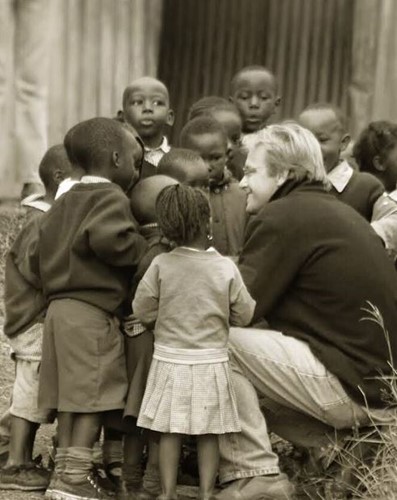
Above: Gavin pictured with children in Kibera slum, Nairobi
Many of the children he worked with in the slums are now doctors, dentists, engineers and community health workers. Others continue to work with Gavin in his adventure travel business Adventure Alternative. Here, he explains why he started the charity and how it has grown into the success it is today…
Why did you start your charity?
I started the charity while living in the slums around Nairobi in the early 1990s. At the time, I was working in various jobs – building medical clinics with Medecins Sans Frontieres, as an aid driver to refugee camps and as a school teacher in the slums. One of my jobs involved re-uniting street children with their families and getting them back into school. These children can end up on the street simply by wandering too far from their homes in the slums before getting lost, or they might have been sent away. Either way, we usually had just a few days before they might turn to crime, sniffing glue or even prostitution to survive. Those first nights living on the streets is very hard, after which they join gangs and survive by any means. Many get picked up by the police and put in jail where they can stay for days, often packed a dozen to a cell with barely any food to eat. Pretty quickly the awful conditions means they get sick.
How did this translate into starting the charity?
I spent a lot of time in the city paying bribes to release the children, getting them medical treatment and re-uniting them with their families and trying to get them back into school. I ran extra curricular activities and weekend camping and all sorts of things to try and give them something productive and fun and normal to do. This I funded out of the money I was making taking clients on holidays and up mountains. I worked with the families to support the child in school and create a stable structure in their life.
One of the problems with many western charities I saw back then is that they focused on just helping with primary school costs or re-housing children in 'homes' for orphans or the like, effectively taking them away from their families and the environment they knew. This ostracised them from their own community. In fact many of the street kids I met were actually beneficiaries of charities. They weren't welcome back in the community so they lived rough. I could see that these charities were dealing with the symptoms and not the problem. I wanted Moving Mountains to look at everything in these children’s lives, from nutrition, medical care and family support, to church, education and jobs. The aim was to be a kind of surrogate family. I knew very well that the casually marketed '£10 a month to save a childs life' was fundamentally wrong, it takes more than just money and it needs to be a long term emotional investment in an individual.
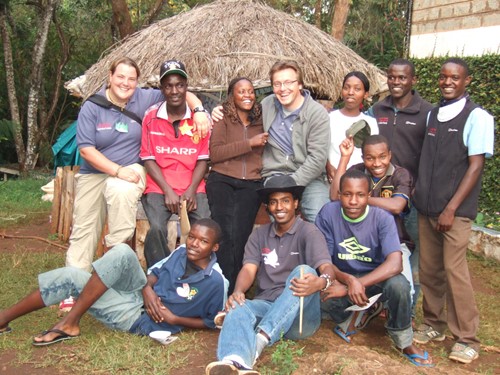
Above: Gavin with a few of the former street children he first met back in 1996
As well as helping with school lessons, I set up extra curricular activities to give these kids something to do that would prevent them from running away after school through boredom, like drama and reading clubs, camping, safaris, visits to the coast, Christmas parties. With teachers and social workers I worked with families to help them see these kids as an asset instead of a burden. This was especially true for girls who would often be married off at a young age rather than be educated. I wanted to invest in these girls and get them to secondary school, so they could go on to be a proper asset to their families.
It was often a delicate task tackling embedded cultural beliefs and encouraging behavioural change in order to essentially create social mobility and a way out of the poverty trap. I called the charity Moving Mountains because change for a lot of these children was going to be as hard as moving a mountain and would probably be generational.
It has taken 20 years and many of those seven-year-old kids I was teaching are now approaching 30 and they don’t suffer the privation their parents did, they have an education, proper jobs and their own children are in full education. In many cases they have become middle class. This has brought its own problems though. Some became greedy and selfish, over enamoured with their new material wealth and status. I suppose that is just human nature, there will always be the people who stand out because of their integrity and humbleness and others who struggle to avoid boastfulness.
What are some of those kids doing for jobs now?
They are really varied. One of the kids has just graduated as a doctor from the University of Ankara in Turkey, others have careers in community health, engineering, accountancy, agricultural management and so on. Those who were never too interested in academia have gone on to become local businessmen, carpenters, builders and also tour guides who help with the holidays I run through Adventure Alternative.
Video from Kibera slum in Kenya where former street boy, Kelly Kioko, describes his relationship with Gavin
How many children have been helped through Moving Mountains?
When I started it was just one school in Nairobi, but we have now built and renovated 18 schools and put hundreds and hundreds of students through education.
To take a child through education from age six to twenty six costs a huge amount of money over many years, but I have always felt it’s better to do a good job with a few people than a mediocre job with a lot.
How did you fund the charity in the beginning?
Initially it was paid for entirely by the money I raised by climbing mountains. I’d guide people up Kilimanjaro or Mount Kenya on the weekend and take the fee money back to the slums. At the time I was living in a two-room house with minimal running water and electricity, so my cost of living was very small and all of my earnings could go back into the project. I lived a very frugal life, but I have to say it was enormously fulfilling.
How did you get it off the ground properly?
In 2002, I registered Moving Mountains with the charity commission, brought on friends to become trustees and formalised it as a charity. By then I had started to do a lot of work in Nepal with some of my Sherpa friends as well and obviously the costs began to rise. So I started to do higher profile mountaineering expeditions like climbing Everest to raise money and that side of the fundraising has raised about £1.9m. Nowadays, Adventure Alternative’s income is the biggest supporter of the charity financially, but in addition groups come out from schools, universities and businesses to work on projects that we’ve been running for years.
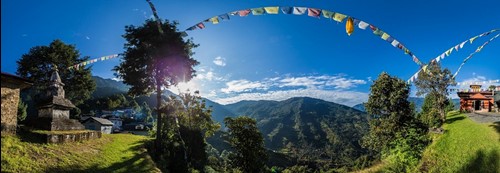
Panoramic view of Bupsa in the Himalayas, one of the villages benefitting from our work
What are the big pitfalls to avoid when starting a charity like Moving Mountains?
You need to aim to create independence, not dependency. Always have a strategy to render yourself unnecessary, even if it takes a long time. I wanted the long term support of children at school to create financially independent adults who themselves would be able to provide for their own family. Similarly with the community work in the Himalayas, the investment in projects has to have a sustainable foundation so that the charity isn't burdened with 'ownership' forever. It has to be given to the community with a plan for the upkeep, and an ability to upscale the model. In Nepal the villages I have been working in have become successfully self-sufficient and thriving. I believe in a leg up, not a hand out. In order to achieve this you have to understand something about development economics, about the philosophy and attitudes towards social development, and you need to know an area and the people who live in it very well. You can't do this sort of work just to feel good, you need to know what you're talking about.
What are the biggest challenges Moving Mountains faces now?
It is always fundraising. We aren’t of a size where we can bring in professional fundraisers, so we can’t take the charity much further in terms of growth because we don’t have enough resources. Currently we are stuck at a certain level, a plateau. like many small businesses. That is why awards like the Points Of Light and the Responsible Tourism Awards that Adventure Alternative won really help, because they raise our profile.
What help does Moving Mountains provide nowadays?
It helps mainly with education, health and social welfare. Within education, we provide teachers, education and mentoring costs for the child from primary to university and beyond, as well as building infrastructure through equipment and the school buildings.
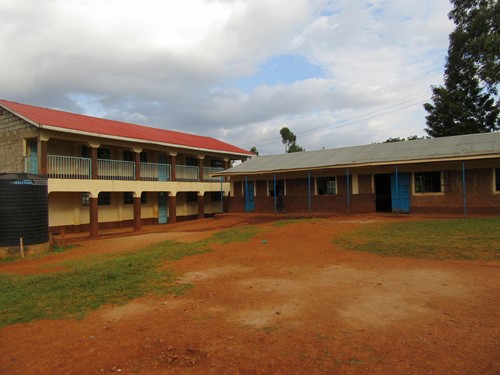
Above: Gatwe Primary, on slopes of Mt Kenya, after being re-built by Moving Mountains
In health, we have the holistic view of helping the whole family mentally and physically, with both medical clinics and counsellors and community health programmes.
Mental health is vital, without emotional support for the family the child won’t be able to develop to his or her full potential. It's never just about school fees, it's a childs life with everything that is involved in that.
In social welfare, we build everything from water wells to monasteries, depending on what each community needs. Hydro electric power stations, water supplies into homes, cooking stoves, children's homes, early child development centres and so on. The list is long.
We do a lot of work in the UK too with the personal development of teenagers in schools and trying to change the prejudicial views some people have about development itself. This is very popular because there is a lot of emphasis on life skills, ethical values, civic engagement and volunteering.
What are you most proud from your work with Moving Mountains?
I love going back to villages in the Himalayas that were completely empty when I first saw them; families are now moving to the region because the schools are great, there is clean water and electricity. It's a healthy, thriving, busy place to be now and I love being accepted there as one of the Sherpas.
I am proud when I am talking to those kids who I first met back in the slums, who are now adults and good friends of mine. I know their family’s back story and how difficult life was for them growing up. So to see them now as balanced people with good jobs and kids of their own, to talk to them and find out what they are up to – I absolutely love that. Equally, I'm saddened by the ones who didn't turn out so well, but that I think is just life and a lot it still yet to happen.
Some of the children from the remote hill farms in the Himalayas are now in the US studying dentistry and medicine. It's testament to their parents drive and motivation, and I feel very privileged to be a part of those families and to see how far they have come. These are all great people and they broke the poverty trap. Moving Mountains was there to help them but ultimately it was their achievement and that makes me feel very happy.
Why are the volunteering projects Moving Mountains does so important?
Aside from the way that they fund the charity work that we do, I think that it is important to engage young people in what is really happening in the world.
Young people nowadays have a very strong idealism and integrity – they really want to change the world but what they do and say on social media doesn’t always translate into an emotional and physical response. That’s why I believe so strongly in taking people out to see what is going on.
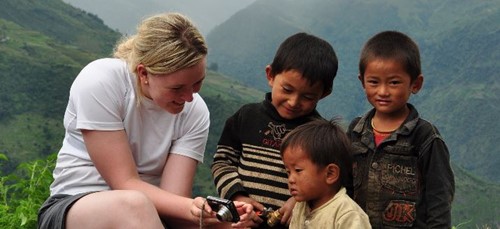
Above: Nepal volunteer shares a memory with some of the kids at Bumburi village
What can people do to help?
Obviously a lot of our work is around programmes that give people work, like the salaries for the teachers in Nepal villages who teach 1000 kids, or the teachers and counsellors in Kenya that support children through to university. So like any charity we need funds and a lot of that is from donations, but organisations can also get involved now by inviting Moving Mountains to become an official partner. We provide courses on personal development, international development, leadership, corporate giving and global citizenship in return for supporting our work.

